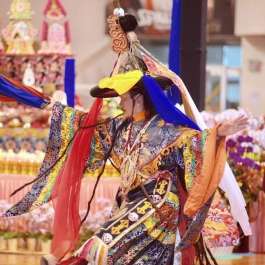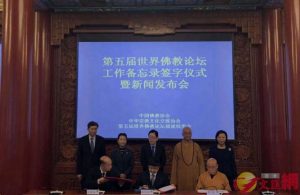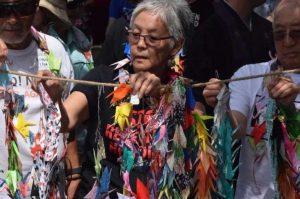
Hundreds of Buddhist monks have fled two major towns in eastern Myanmar media reports said on Sunday, citing eye-witness accounts. The departure of the monastics comes in the wake of an exodus of tens of thousands of civilians amid violent clashes between military troops and armed rebels who oppose the military regime that overthrew Myanmar’s elected government 11 months ago.
Amid the escalating violence, the United Nations estimates that almost 90,000 people have been displaced from eastern Myanmar’s Kayah State, largely from the town of Loikaw and nearby Demoso. Local NGO’s have estimated the figure at closer to 170,000. Both townships are considered strongholds for anti-junta groups.
A monk was quoted as saying that around 30 Buddhist monasteries in Loikaw and 12 more in Demoso had been vacated. The flight of the monks serves to underscore the gravity of the situation in Myanmar, where Buddhist temples are generally regarded as safe havens.
“It was impossible for us to stay there,” the monk said on condition of anonymity. “It was hard to make the decision to leave, but we had to do it.” (Mizzima)
In the wake of the coup in February last year, the junta—the military-led State Administrative Council—has consolidated its hold on power with violent crackdowns on public dissent and street demonstrations, which continue in defiance of the military-led suppression. Even the country’s venerated monastic sangha have found themselves in the military’s crosshairs in recent months.*
Buddhist monastics are highly influential in Myanmar (formerly Burma), a predominantly Theravada Buddhist country. Monks stood at the forefront of pro-democracy protests against the previous military junta in 2007, a movement known as the Saffron Revolution, which helped to bolster grassroots support among the general population. Buddhist monks in Myanmar are estimated to number in excess of 500,000, mainly centered in and around the cities of Yangon and Mandalay, along with some 75,000 Buddhist nuns.**
About 89.8 per cent of the population of this Southeast Asian nation identify as Buddhists, predominantly followers of the Theravada tradition, according to census data for 2016. Christians make up 6.3 per cent, Muslims 2.3 per cent, and Hindus 0.5 per cent, with tribal and “other” religions comprising 1 per cent, and 0.1 per cent reporting no religious affiliation. Groups representing all religious communities—including monastics and clergy—have taken to the streets and demonstrated against the military takeover.
Despite 11 months of violent suppression since the coup, the junta continues to face widespread opposition to its rule. Crackdowns on peaceful protest movements and civil disobedience campaigns have seen a rise in communities resorting to armed resistance, often with support from existing ethnic militia groups.
The military has responded with escalating force aimed at discouraging dissent. Over Christmas, the bodies of at least 35 people, including children and two workers from the Save the Children NGO, were massacred and their bodies burned.
Myanmar’s military declared a year-long state of emergency on 1 February 2021, after detaining President Win Myint, State Counselor Aung San Suu Kyi, and other members of the governing National League for Democracy (NLD) party. The coup d’état took place just hours before the country’s new parliament was due to convene following a general election in November 2020, during which the NLD made substantial electoral gains.
The military, which had backed the parliamentary opposition in the national election, has asserted that it staged the coup in response to electoral fraud, however the national election commission said that there was no evidence to support these claims. The NLD won around 80 per cent of the available parliamentary seats in the 2020 vote.
In November last year, United Nations aid chief Martin Griffiths warned of the rapid deterioration of the humanitarian situation in Myanmar. He noted that more than three million people in need of life-saving aid due to escalating violence and a crumbling economy. “More than 37,000 people, including women and children, have been newly displaced, and more than 160 homes have been burned, including churches and the offices of a humanitarian organization,” Griffiths said. (Reuters)
Since seizing power, the self-styled State Administration Council (SAC), led by military commander-in-chief General Min Aung Hlaing, has unilaterally amended the country’s treason and sedition legislation in an apparent bid to secure impunity for the coup leaders.
In response to the crisis, the International Network of Engaged Buddhists (INEB) and the Clear View Project launched an international appeal, calling for urgent humanitarian relief for Buddhist monks and nuns living in Myanmar in the shadow of the junta.***
“The International Network of Engaged Buddhists and the US-based Clear View Project are coordinating an urgent appeal to raise funds to support the humanitarian emergency in Myanmar that focuses on Buddhist monks and nuns,” INEB said in a message shared with BDG. “Nearly three months ago, on 1 February, the Myanmar military staged what they considered would be a ‘quick coup’ in which democratically elected members of government, including President U Win Myint and State Counsellor Daw Aung San Suu Kyi, were detained. Since that time, the country has been in turmoil with the people responding by taking a civil disobedience movement to cities and villages across Myanmar.”
The Myanmar- and Thailand-based human rights organization Assistance Association for Political Prisoners (AAPP) reported that as of 14 January, 1,469 people were confirmed to have been killed by the military junta. The organization noted that the figure represented only deaths that the AAPP could independently verify and that the actual number was likely much higher. A total of 8,603 people are known to be in detention, with 603 sentenced to prison terms and 80 sentenced to death—some in absentia, the AAPP said.
Daily metta chanting
— Democratic Buddhism In Myanmar (@democracticbimm) January 16, 2022
Monks' union, mandalay#WhatsHappeningInMyanmar#2022Jan16Coup
May rebels, people defense force members and civilians who are fighting in every field to be free from dictators be safe and healthy. pic.twitter.com/Tx9lKOHxV5
* Buddhist Monastics Targeted in Ongoing Crackdown by Myanmar’s Military Junta (BDG), Myanmar Junta Drops Plan to Place Buddhist Monks on Military Roadblocks (BDG)
** 80-Year-Old Monk Becomes a Symbol of Hope for Myanmar Buddhists (BDG)
*** INEB, Clear View Project Launch Humanitarian Appeal for Buddhist Monastics in Myanmar (BDG)
See more
URGENT APPEAL for Humanitarian Relief to support Buddhist Monks and Nuns in Myanmar’s Political Movement Against Military Dictatorship (International Network of Engaged Buddhists)
Myanmar monks flee temples in Loikaw and Demoso amid intense fighting (Mizzima)
Fight between military and rebels intensifies as hundreds of monks flee Myanmar: Report (Wion)
Fleeing urban warfare in Loikaw (Myanmar Now)
U.N. aid chief says Myanmar deteriorating, Security Council meets (Reuters)
Daily Briefing in Relation to the Military Coup (Assistance Association for Political Prisoners)
Related news reports from BDG
Religious Leaders in Myanmar Decry Persecution by Military Junta
Burmese Human Rights Lawyer U Nay Min Dies of COVID-19, Aged 75
UPDATE: Socially Engaged Buddhist Groups Deliver Medical Relief to Pro-democracy Protestors in Myanmar
Pro-democracy Protesters Hold Silent Strikes During Myanmar’s Buddhist New Year Holiday
INEB, Clear View Project Launch Humanitarian Appeal for Buddhist Monastics in Myanmar
UPDATE: INEB Calls for Reconciliation in Myanmar as Pro-democracy Protests Turn Violent
Peace Sangha Union Issues Statement on Myanmar Coup as Buddhist Monks Join Pro-democracy Protests
Related features from BDG
Myanmar: A Month into the Coup
The Other Shoe Drops: Reflections on Myanmar’s Latest Coup
A Reflection on the Intellectual and Socio-Cultural History of Buddhism in Myanmar
Sea of Suffering: The Rohingya and the Conundrum of Buddhist Terror
Buddhistdoor View: Reconciling Nationalism and Buddhism













